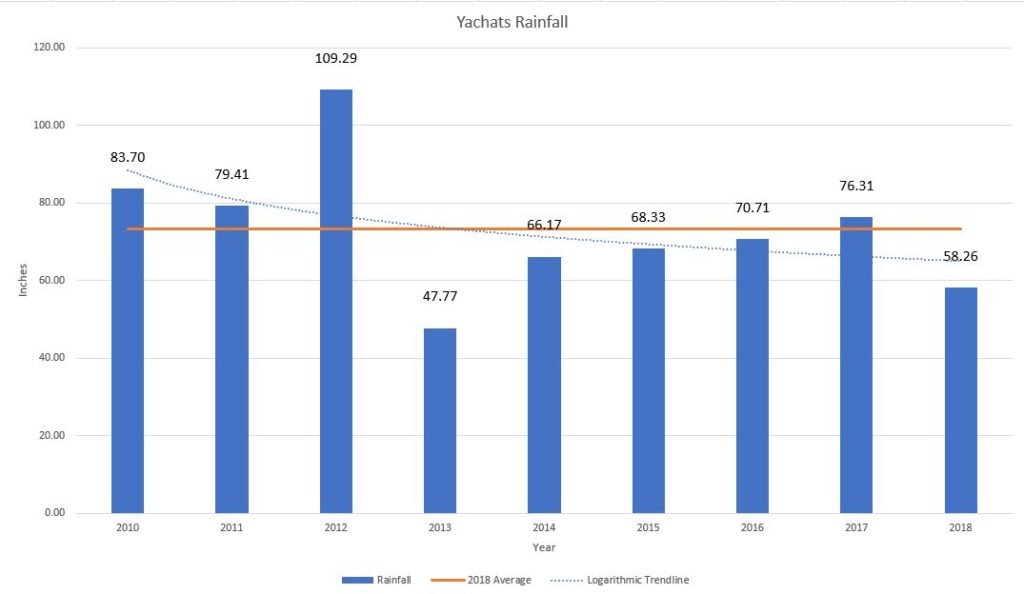
By QUINTON SMITH/YachatsNews.com
Yachats received a bit more than 58 inches of rain in 2018, the second lowest amount in the past nine years, reinforcing worries how the city collects, stores and distributes water during the driest months of summer.
When midnight arrived Dec. 31 the rain gauge at the city’s wastewater treatment plant near downtown registered 58.26 inches for the year, boosted by more than 10 inches that fell in December alone. Only 47.77 inches of rain in 2013 was lower in records kept by the city since 2010. The average during that time is 75.2.
“Low water started early and ended late,” said Rick McClung, who oversees the city’s water system. “That has been the trend for a while.”
Last year was also only the second in the past decade – the previous was in 2015 — where the city declared a first phase emergency, putting moderate restrictions on water use.
“Yachats, at least along the coast, is the neediest,” said McClung. “We’re the only city which went to a Phase One restriction.”
The city gets its water from the Yachats River and two small streams, Reedy and Salmon creeks. The first of three levels of restrictions kick in when flow in the Yachats River is 35 cubic feet per second and the combined flows in Reedy and Salmon creeks are less than 275 gallons per minute.
In 2018 the restrictions took effect right after July 4 and lasted until the first heavy rains in October. They require an alternate-day landscape watering schedule, prohibit sales of water to non-customers, stop any fire drills, hose testing or hydrant flushing and restrict the use of ornamental fountains.
It hasn’t happened yet, but if water levels in the three streams continued to drop the city goes through two more stages of restricting residential and commercial water use.
The city has six reservoirs with a capacity of 1.64 million gallons. The sixth reservoir, with a capacity of 250,000 gallons and costing $1.7 million, came online late in the summer.
“It’s already made a difference,” McClung said. “It allows me to make more water.”

The treatment plant were McClung works can produce 400,000 gallons of water a day, enough to last 10 days in the winter and seven days in the summer. But one day of a busy summer weekend, McClung says, can drain one-fifth of the city’s storage.
“That’s the issue – we get more people when there’s less water,” he said.
And that’s the problem with coastal water systems – there’s generally plenty of rain in the winter and spring but not enough storage to help make it stretch through the summer.
One of the suggested priorities for 2019 by the outgoing City Council is more long-term work on “water security” issues.
“We are not the only city with significant water issues,” outgoing City Council member Craig Berdie said during the group’s Dec. 12 meeting. “Every community on the coast has this issue.”
Years ago, McClung said, the city investigated drilling wells but found the water closest to town too brackish. Up the Yachats River, he said, the flows from a possible municipal well weren’t sufficient.
McClung is exploring the potential to create an open reservoir up the Yachats River that would catch winter runoff, then direct it into the city system if needed during the summer. And the city is trying to work with a reluctant out-of-state landowner to possibly sell his partially-logged property that feeds into Salmon Creek near the treatment plant to better safeguard that watershed.
The city is also part of a fledgling group, the Mid-Coast Water Planning Partnership, formed by water providers in Lincoln County to look at long-term water issues.
“We used to not publicize our water issues,” McClung said, for fear of scaring off tourists and alarming residents. “But that’s changed because we can’t sweep this problem under the rug and we need to have everyone be aware of it.”



Thank you so much for giving us the information. This is the raw data I’ve been hoping to get since I built my house in 1988. Thank you for your newspaper. B
Hi Betty: The raw water data can be found on the city Web Site. http://www.yachatsoregon.gov. Use the top navigation to go to Reports and then select Water. There you can find rainfall, water use and more. This article has added the capacity and helpful background information.
It is my understanding that Yachats has water rights on the Yachats River but has NO means of using the water mainly due to cost and that when the City needs water the stream flows are to low to take water out.